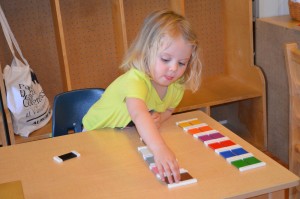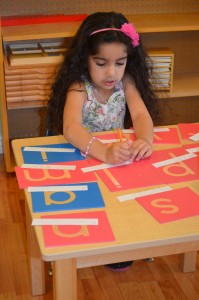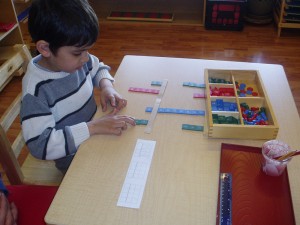Three Year Program
The Three Year Program
The Montessori program is a series of progressions, each skill being a foundation for future learning. While a child can enter the Montessori program at any age, the optimum experience is for a child to enter at around three years of age and stay in the program for three years, until they enter grade one. The work the three year old child does in their first year, builds a foundation for success in their achievements in their third year of the program.
Here is a snapshot of the typical development when a child is in the Montessori program for the full three years. Of course every child is unique and their progress is at their own pace, so the actual work each child does varies. Typically, a child entering at 5 years of age will not be doing the same work as a 5 year old that is in their third year of a Montessori program.
First Year
 The child enters the classroom between the ages of 2.5 to 3.5, whenever they are toilet-trained and showing a readiness for school. The child learns to better control and coordinate their movements through work done in the Practical Life area such as pouring, sweeping, and simple dressing frames such as buttons. They are building up their ability to concentrate and preparing their mind and physical self for later Math and Language work. The young child also learns what it means to be a part of a larger community by following rules and respecting fellow classmates. The young child spends a lot of time observing other children do their work. A lot of work is also done in the Sensorial area, as the child clarifies their sensorial impressions of their life experiences. The order that is created in the child’s mind during this time is key to further learning. The three year old child is also engaged in vocabulary building, ability to recognize phonetic sounds in words, and learning to trace the sandpaper letters. Some children are ready to begin their work in mathematics by gaining a concrete understanding of numbers one through ten.
The child enters the classroom between the ages of 2.5 to 3.5, whenever they are toilet-trained and showing a readiness for school. The child learns to better control and coordinate their movements through work done in the Practical Life area such as pouring, sweeping, and simple dressing frames such as buttons. They are building up their ability to concentrate and preparing their mind and physical self for later Math and Language work. The young child also learns what it means to be a part of a larger community by following rules and respecting fellow classmates. The young child spends a lot of time observing other children do their work. A lot of work is also done in the Sensorial area, as the child clarifies their sensorial impressions of their life experiences. The order that is created in the child’s mind during this time is key to further learning. The three year old child is also engaged in vocabulary building, ability to recognize phonetic sounds in words, and learning to trace the sandpaper letters. Some children are ready to begin their work in mathematics by gaining a concrete understanding of numbers one through ten.
Second Year
 Based upon their building up of motor development and ability to reason in Practical Life from their first year, the child begins to carry out more complex work in the Practical Life area. Some of this work includes washing linens, polishing silver, and tying bows. In Sensorial, the child has created knowledge of basic sensorial concepts such as colours, shapes, textures, and sounds. The child continues to refine their senses by grading these materials and using the advanced sensorial materials. In Language, the child begins using the moveable alphabet to form words and does a lot of work with the metal insets to improve their pencil control. In Mathematics, the child solidifies their knowledge of numbers up to ten and continues counting up to one thousand. The child also begins work with the decimal system and is introduced to different mathematical operations such as addition and subtraction.
Based upon their building up of motor development and ability to reason in Practical Life from their first year, the child begins to carry out more complex work in the Practical Life area. Some of this work includes washing linens, polishing silver, and tying bows. In Sensorial, the child has created knowledge of basic sensorial concepts such as colours, shapes, textures, and sounds. The child continues to refine their senses by grading these materials and using the advanced sensorial materials. In Language, the child begins using the moveable alphabet to form words and does a lot of work with the metal insets to improve their pencil control. In Mathematics, the child solidifies their knowledge of numbers up to ten and continues counting up to one thousand. The child also begins work with the decimal system and is introduced to different mathematical operations such as addition and subtraction.
Third Year
This is the year where the foundations built in previous years come together to provide great joy in their achievements. The children gain a sense of responsibility and self-confidence as they take care of the needs of the classroom and give presentations to younger members of the class. In Language, the children are reading, first phonetically and then learning phonograms and sight words. To further challenge the child, sentence analysis begins. In Mathematics, the child continues doing four digit mathematical operations (addition, subtraction, multiplication, and division) with the decimal system. They also explore single digit equations to further understand how the operations work and through this exploration, they begin to memorize simple equations. The child also focuses more on the extensions in the classroom as their ability to understand concepts that are not concretely in front of them comes together. The child emerging from three years of Montessori primary education are full of curiosity of their world, self-confidence, and hold a strong foundation for future enjoyment of learning.

